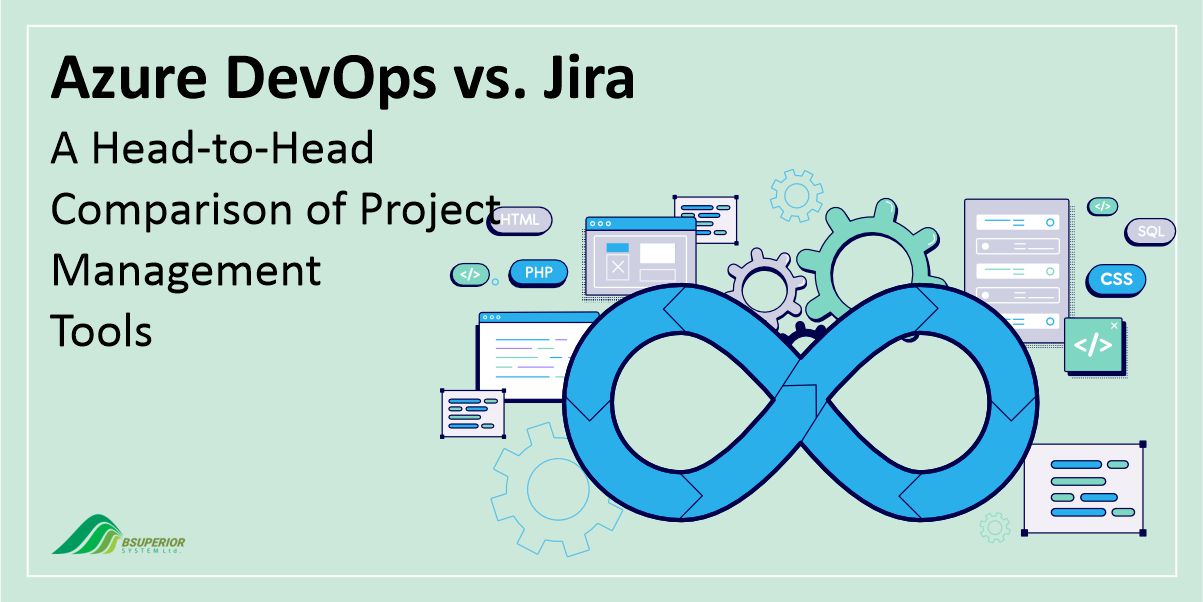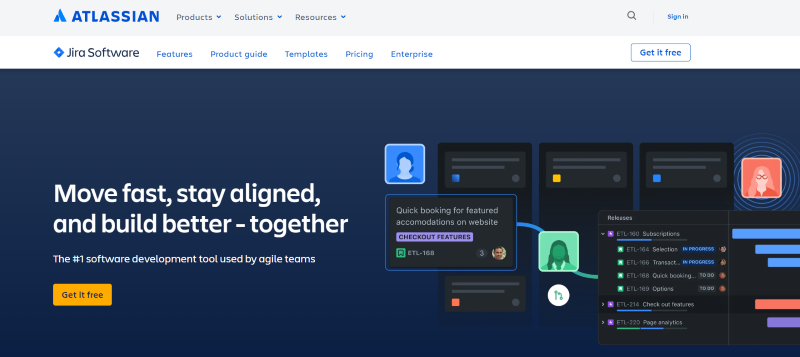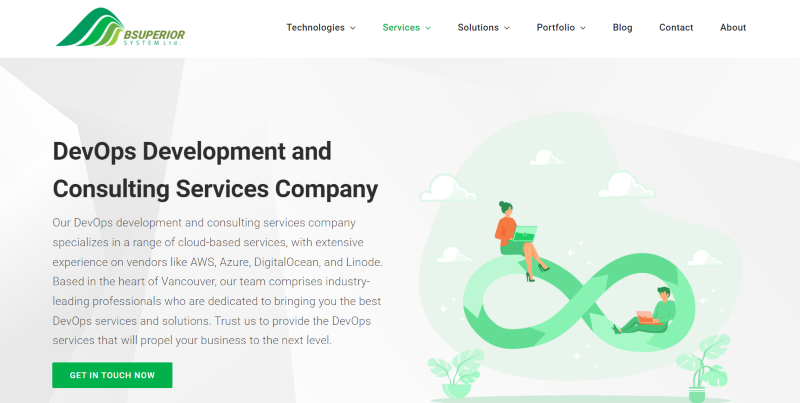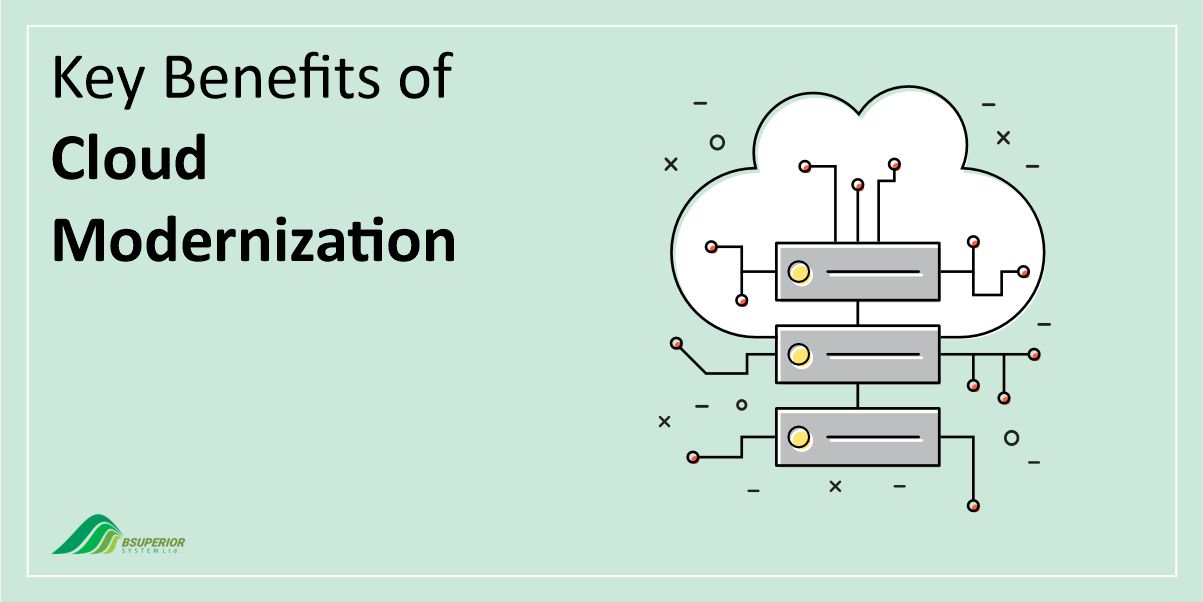Azure DevOps vs. Jira: A Head-to-Head Comparison of Project Management Tools

Table Of Content
- What is Azure DevOps?
- What is Jira?
- Azure DevOps vs. Jira: Use Cases
- Azure DevOps vs. Jira: How Are They Similar?
- Azure DevOps vs. Jira: Main Differences
- Can I Use Jira with Azure DevOps?
- Weighing the Anchors: Azure DevOps vs. Jira Pros and Cons
- Is Azure DevOps Better than Jira?
- Final Words – Introducing BSUPERIOR
In the bustling realm of software development, choosing the right project management tool is akin to picking the perfect compass for your journey.
In this blog post, we’ll delve deep into the intricate landscape of Azure DevOps and Jira. From agile methodologies to seamless integrations, we’ll equip you with the knowledge to make an informed decision and chart the course for your development team’s future.
What is Azure DevOps?
Developed by Microsoft and hosted within the Azure cloud environment, Azure DevOps offers a comprehensive approach to software project management.

Designed for teams with varied skillsets, it supports the entire software development lifecycle, from ideation to deployment. Its functionality is segmented into five services: Pipelines, Boards, Repos, Artifacts, and Test Plans.
These can be utilized individually or in combination, catering to specific team needs. Azure DevOps has gained significant popularity for its capabilities in project tracking and team collaboration.
What is Jira?
Jira, a software platform developed by Atlassian, has established itself as a prominent tool for project management and issue tracking.

Initially conceived to address the needs of software development teams, particularly in bug tracking and agile project management, Jira has since expanded its capabilities to encompass diverse industries and project types.
Jira’s strength lies in its flexibility. It can be adapted to various development methodologies, including Agile, Waterfall, and hybrid approaches.
Additionally, its seamless integration with other tools, such as code repositories and communication platforms, further enhances team collaboration and streamlines development processes.
Azure DevOps vs. Jira: Use Cases
Both Azure DevOps and Jira are popular tools used for software development and project management, but they cater to slightly different needs and workflows. Let’s delve into some of the key use cases that showcase the versatility of these tools.
Read more: GitOps vs. DevOps: The Showdown
Use Cases of Azure DevOps
1. Streamlined Development with CI/CD Pipelines
Azure DevOps facilitates the automation of software development processes through CI/CD pipelines. These pipelines automate code build, testing, and deployment, ensuring thorough testing and efficient delivery of code changes.
2. Centralized Source Code Management
Azure DevOps provides a central repository for teams to store, manage, and version control their source code. This centralized platform enables easy collaboration through pull requests and branch policies.
3. Agile Project Management Support
Azure DevOps caters to Agile project management methodologies like Scrum and Kanban. Teams can create and manage work items, track progress, and prioritize tasks within a unified platform.
4. Comprehensive Testing Management
Azure DevOps offers a robust testing platform for managing the testing process. Teams can define and run automated tests, manage test cases, and monitor test results efficiently.
Use Cases of Jira
1. Project Management
At its heart, Jira Software serves as a robust project management tool. Teams can define projects, set milestones, assign tasks, and track progress visually through boards.
This centralized organization promotes transparency and efficiency in managing timelines and workloads.
2. Agile Software Development
Jira Software seamlessly integrates with Agile methodologies, specifically supporting Scrum and Kanban. Its features enable backlog management, sprint planning, task tracking, and continuous improvement cycles, facilitating iterative development and rapid delivery.
3. Issue Tracking
Streamlined issue tracking is another key facet of Jira Software. Teams can report, prioritize, assign, and resolve issues within a centralized platform. This fosters effective communication, accountability, and timely problem resolution.
4. Bug Tracking
Development teams can use Jira Software’s bug-tracking capabilities to categorize, prioritize, and assign bugs for resolution. Jira also maintains a history of bug fixes, enabling teams to monitor progress and identify patterns.
Azure DevOps vs. Jira: How Are They Similar?
While Azure DevOps and Jira specialize in different areas of software development, they share several key strengths that make them popular choices for modern teams. Here’s a look at their common ground:
Versatile Functionality
Both platforms offer modularity and the ability to choose functionalities based on specific needs.
Azure DevOps tools can work independently or seamlessly integrate for a unified experience. On the other hand, Jira can adapt to various management processes beyond just software development.
Leadership in Application Lifecycle Management
Both Azure DevOps and Jira are recognized leaders in Application Lifecycle Management (ALM). They offer features that span the entire software development lifecycle, from planning and tracking to deployment and maintenance.
This holistic approach helps DevOps teams stay organized, collaborate effectively, and deliver high-quality software.
Enterprise-Ready and Widely Adopted
Both platforms are built for enterprise use and are trusted by organizations of all sizes. Their robust features and scalability make them suitable for handling complex projects and large teams.
Additionally, their widespread adoption means they integrate well with existing tools and workflows, making them easy to implement and use.
Methodology Agnostic
Both Azure DevOps and Jira offer flexibility in project management methodologies. They typically support basic, agile, Scrum, and CMMI setups, allowing teams to switch between these approaches as needed.
Read more: DevOps vs. DataOps: Which Tool Builds Your Data Empire?
Azure DevOps vs. Jira: Main Differences
While both platforms offer powerful features and enjoy widespread popularity, their key differences can significantly impact your decision. To navigate this choice effectively, it’s essential to understand the key distinctions between these two giants.
| Features | Azure DevOps | Jira Software |
| Scope and Focus | Comprehensive SDLC coverage, collaboration, and management | Agile-focused project management and issue tracking |
| Simplicity and Usability | Intuitive interface, minimal setup complexity | Extensive customization, steeper learning curve |
| Project Management | Robust work item tracking, backlogs, portfolio management | Issue tracking, Agile boards, roadmap management |
| Source Code Management | Holistic approach with Git integration and advanced tools | Basic version control and code review capabilities |
| Integration with Tools | Integration with Microsoft tools, cohesive ecosystem | Wide range of integrations with various tools |
| Traceability | End-to-end clarity, visual representation of relationships | Powerful search, reliance on third-party plugins |
| Pricing | Starts at $6/user/month, free trial for 30 days | Starts at $7.75/user/month, free trial for 7 days |
Azure DevOps vs. Jira comparison
Below we’ll shed light on the distinct capabilities of each platform and how they cater to diverse needs.
1. Scope and Focus
Azure DevOps
A comprehensive platform covering the entire software development lifecycle (SDLC), from planning and development to testing and deployment.
It offers a wide range of services and tools, including work tracking, version control, and CI/CD pipelines, fostering seamless collaboration and centralized project management.
Jira Software
Jira primarily focuses on project management and issue tracking. While it doesn’t include the entire SDLC like Azure DevOps, it excels in providing features specifically tailored for agile methodologies and effective issue management.
Its functionalities like project planning, progress tracking, and data-driven decision-making enable teams to adapt and optimize their workflows.
2. Simplicity and User-Friendliness
The ease of use and initial setup can significantly impact software team adoption and productivity. Here’s how the platforms differ:
- Initial Setup and Usability: Azure DevOps shines with its intuitive interface and minimal configuration. This makes it a top choice for teams seeking swift project initialization.
Jira, on the other hand, has extensive customization options, but this also introduces complexity and can be overwhelming for new users. - Customization and Learning Curve: Azure DevOps strikes a balance, offering straightforward functionalities that cater to diverse skill levels without overwhelming users.
Jira’s vast customization, while powerful, requires more time investment to understand and implement effectively.
3. Project Management
Both Jira Software and Azure DevOps offer a range of project management features, including tools for customizing workflows, visualizing project progress through boards, and managing Agile practices.
While Azure DevOps excels in offering comprehensive work item tracking alongside project management capabilities, Jira shines in flexible workflow customization and agile project management. Let’s take a look at the project management features of these two in more detail.
Azure DevOps
- Item Tracking: Offering robust work item tracking, Azure DevOps supports various work item types like tasks, bugs, and user stories. Relationships between work items can be easily defined, providing a comprehensive view of project progress.
- Backlogs and Boards: Azure DevOps features hierarchical backlogs for organized and prioritized work item management. Its agile boards can be customized to reflect different team processes.
- Portfolio Management: For organizations managing multiple projects, Azure DevOps provides portfolio management features for high-level progress tracking.
Jira Software
- Issue Tracking: Excelling in issue tracking, Jira allows users to create, prioritize, and manage tasks, bugs, and feature requests comprehensively. Its customizable workflows enable teams to tailor the issue lifecycle to their specific needs.
- Agile Boards and Scrum: Jira thrives in supporting agile methodologies, particularly Scrum. Agile boards facilitate sprint planning, progress tracking, and backlog management visually, offering real-time insights into project status.
- Kanban Boards: For teams preferring continuous flow, Jira offers Kanban boards to handle work items flexibly. These boards focus on optimizing workflow efficiency and minimizing bottlenecks.
- Roadmaps and Versions: Planning releases becomes seamless with Jira’s roadmaps and version management features.
3. Source Code Management
Both platforms offer SCM capabilities but with distinct approaches:
Azure DevOps
Azure DevOps embraces a holistic approach with seamless integration with Git and other version control systems.
It provides a feature-rich environment for branch management, pull requests, thorough code reviews, and automated builds.
Jira Software
Jira focuses on its core strengths of issue tracking and project management, offering basic SCM tools like version control and code review. While functional, it lacks some advanced features compared to Azure DevOps.
4. Integration with Development Tools
Azure DevOps
As a Microsoft product, Azure DevOps has seamless integration with a range of Microsoft development tools like Visual Studio, Azure Repos, and Azure Pipelines, creating a cohesive development ecosystem and simplifying automation tasks for developers.
Jira Software
Jira offers a wider ecosystem of integrations, connecting to various development tools and services like GitHub, CI/CD tools, and communication platforms like Slack and Teams. This flexibility allows teams to tailor their workflow by connecting Jira to their preferred tools and environments.
5. Traceability
Traceability in software development is a crucial practice for linking requirements to various stages of development, ensuring transparency and collaboration. Let’s see how Azure DevOps and Jira approach traceability.
Azure DevOps
- End-to-End Clarity: Azure DevOps excels in traceability and provides a comprehensive view of a project’s journey from conception to completion.
It meticulously captures details, milestones, and even incremental changes, offering a granular understanding of development progress. - Interconnected Ecosystem: Azure DevOps shines in its ability to seamlessly trace relationships between projects by creating a holistic picture of the entire development landscape. This interconnected view fosters better collaboration and decision-making.
- Visual Understanding: Beyond textual data, Azure DevOps uses visual elements like charts and graphs to represent traceability. This intuitive approach simplifies complex relationships and facilitates easier project understanding.
Jira Software
- No Built-in Tracing Tool: Unlike Azure DevOps, Jira lacks a dedicated traceability feature. While you can manage individual tasks, piecing together a complete picture of changes or group task progress requires extra effort.
- Search Sleuth: Where Jira shines is its powerful search functionality. Users can effortlessly scour through issues, bugs, or even specific terms within a project, ensuring no detail gets lost in the shuffle.
- Plug-in Powerhouse: To bridge the traceability gap, many teams turn to third-party plugins available in the Jira marketplace. These plugins enhance Jira’s traceability features by offering dedicated tools and functionalities.
6. Pricing
Let’s compare the basic pricing plans of Azure DevOps and Jira:
- Free Trials and User Limits: Both platforms offer free trials, with Azure DevOps lasting 30 days for up to 5 users and Jira offering 7 days for up to 10 users.
- Paid Plans: Azure DevOps’ basic plan starts at $6 per user per month or $30 per month for up to 10 users, while Jira’s basic plan starts at $7.75 per user per month.
Can I Use Jira with Azure DevOps?
Yes, you can use Jira with Azure DevOps. In fact, there are a few ways to do it, depending on your specific needs and preferences. Here are a few options:
1. Official Azure DevOps for Jira App
This is the most straightforward way to integrate Jira and Azure DevOps. The official Azure DevOps for Jira app is available on the Atlassian Marketplace, and it allows you to:
- Create and update Jira issues directly from Azure DevOps.
- View Azure DevOps work items in Jira.
- Synchronize statuses and comments between the two platforms.
2. Third-party Integration Apps
There are a number of third-party apps that can help you integrate Jira and Azure DevOps. Some popular options include:
- Xray for Jira by Xray: This app allows you to manage your entire testing lifecycle within Jira, including test case creation, execution, and reporting. It also integrates with Azure DevOps for build and deployment automation.
- Zephyr Scale by SmartBear: This app is another popular option for test management in Jira. It integrates with Azure DevOps for build and deployment automation, as well as other popular CI/CD tools.
- Jira Portfolio for Azure DevOps by Adaptavist: This app allows you to plan and track your Azure DevOps projects within Jira. It provides a unified view of your work across both platforms.
3. Manual Integration
If you’re on a tight budget or don’t need a full-featured integration, you can also integrate Jira and Azure DevOps manually. This involves creating custom workflows and scripts to connect the two platforms.
However, this can be a time-consuming and error-prone process, so it’s generally not recommended unless you have a very specific need.
Weighing the Anchors: Azure DevOps vs. Jira Pros and Cons
Now that we’ve explored the vast arsenals of both Azure DevOps and Jira, it’s time to sharpen our focus on their strengths and weaknesses. While both tools boast impressive capabilities, their strengths and weaknesses might tilt the scales in different directions.
So, let’s have a closer look at the pros and cons of each platform, delving into critical aspects like learning curve, cost, agile support, and integrations
Azure DevOps
Azure DevOps offers a compelling set of features for software development teams, but it’s not without its drawbacks. Let’s delve into the strengths and potential challenges of this platform:
Azure DevOps Benefits
- All-in-One Solution: Azure DevOps has a comprehensive suite of integrated tools, covering the entire software development lifecycle from planning and coding to testing and deployment.
- Language Agnostic: Azure DevOps embraces a wide range of programming languages and platforms, making it a versatile choice for diverse projects and development needs.
- Scalability for Growth: Built on the robust Azure cloud platform, Azure DevOps offers immense scalability to accommodate the needs of large teams and complex projects.
- Microsoft Synergy: Seamless integration with other Microsoft services like cloud solutions and Active Directory creates a cohesive and familiar ecosystem for Microsoft-centric development environments.
- Security at its Core: As a Microsoft product, Azure DevOps inherits the company’s commitment to advanced security features and protocols.
Azure DevOps Limitations
- Steep Learning Curve: With its extensive feature set, Azure DevOps can be daunting for new users, requiring dedicated time and effort to master its full potential.
- Agile Focus Could Sharpen: While Azure DevOps supports Agile methodologies, its dedicated Agile boards and features might not match the robust functionality and user experience offered by tools like Jira.
- Limited Third-Party Ecosystem: While Azure DevOps Marketplace offers extensions, the selection of third-party integrations pales in comparison to the vast library available in the Atlassian Marketplace for Jira.
Jira Software
Jira shines in several areas, making it a popular choice for software development teams. Here’s a closer look at its key advantages and potential drawbacks:
Jira Benefits
- Agile Mastermind: Jira excels in supporting agile methodologies, particularly Scrum and Kanban. Its features like boards, backlogs, and burndown charts empower teams to effectively visualize, manage, and track their agile workflows.
- Tailor-Made Workflows: Jira’s extensive customization options allow teams to personalize their workflows, issue types, and fields to perfectly align with their unique processes and needs.
- Open Collaboration: The rich ecosystem of third-party plugins in the Atlassian Marketplace enables seamless integration with other development tools and services.
- Issue Tracking Powerhouse: Jira’s robust issue-tracking capabilities help teams efficiently manage, prioritize, and track tasks, bugs, and feature requests, ensuring clarity and progress throughout the development lifecycle.
Jira Limitations
- Price Tag: Depending on the number of users and features required, Jira’s pricing can be a significant consideration for smaller teams or budget-conscious organizations.
- Learning Curve: While user-friendly overall, Jira’s extensive customization options can present a steeper learning curve for users who need to delve deeper into its functionalities.
- Limited CI/CD: Compared to Azure DevOps, Jira’s built-in CI/CD capabilities are more limited. While sufficient for basic automation, teams requiring advanced CI/CD pipelines may need to rely on third-party plugins or integrations.
Is Azure DevOps Better than Jira?
Azure DevOps and Jira are like peanut butter and jelly for developers. They are both powerful software development tools, but which one is best for you depends on your needs.
Both platforms cater to most project management needs, so the decision comes down to which features hold the most weight for your team.
If you want a comprehensive solution for managing the entire software lifecycle, from initial concept to deployment, Azure DevOps is your ace in the hole. But if you need a flexible tool for all kinds of projects, not just software, Jira might be the better fit.
Final Words – Introducing BSUPERIOR
BSUPERIOR is a Vancouver-based powerhouse specializing in a wide range of cloud-based services.

Our team of industry-leading professionals, armed with extensive experience on platforms like AWS, Azure, DigitalOcean, and Linode, is dedicated to crafting the best DevOps solutions for your unique needs.
At BSUPERIOR, we recognize every business has its own rhythm, goals, and challenges. That’s why we specialize in tailored DevOps solutions specifically designed to address your unique needs, regardless of size or stage.
For Large-Scale Businesses:
- Operational Efficiency at Scale: Our comprehensive DevOps services cater to your complex ecosystems, ensuring seamless integration, deployment, and scalability.
- Dynamic Environment Mastery: We navigate the challenges of large-scale environments with expertise, guaranteeing uninterrupted operations and smooth adaptation.
For Small and Medium Businesses:
- Optimized Growth Fuel: We empower your team with agile DevOps solutions, maximizing resource efficiency, accelerating delivery, and driving sustainable growth.
- Reliable Partnership: Count on BSUPERIOR as your trusted DevOps partner, providing ongoing support and expertise to optimize your workflow.
For Startups:
- Streamlined Launchpad: Our customized DevOps services help you streamline development and operations from day one.
- Rapid Deployment and Collaboration: Ensure seamless collaboration, rapid product launches, and effective monitoring to lay the foundation for your startup’s success.
No matter your business size or stage, BSUPERIOR crafts the perfect DevOps solution to unlock your full potential. Partner with us and say goodbye to generic solutions – it’s time for an operational masterpiece designed just for you.
We value your input and believe this content may enhance our services. However, it's under review. If you see room for improvement, please use the "Report an issue" button below. Your feedback helps us excel.
Contact us today at –– and speak with our specialist.




